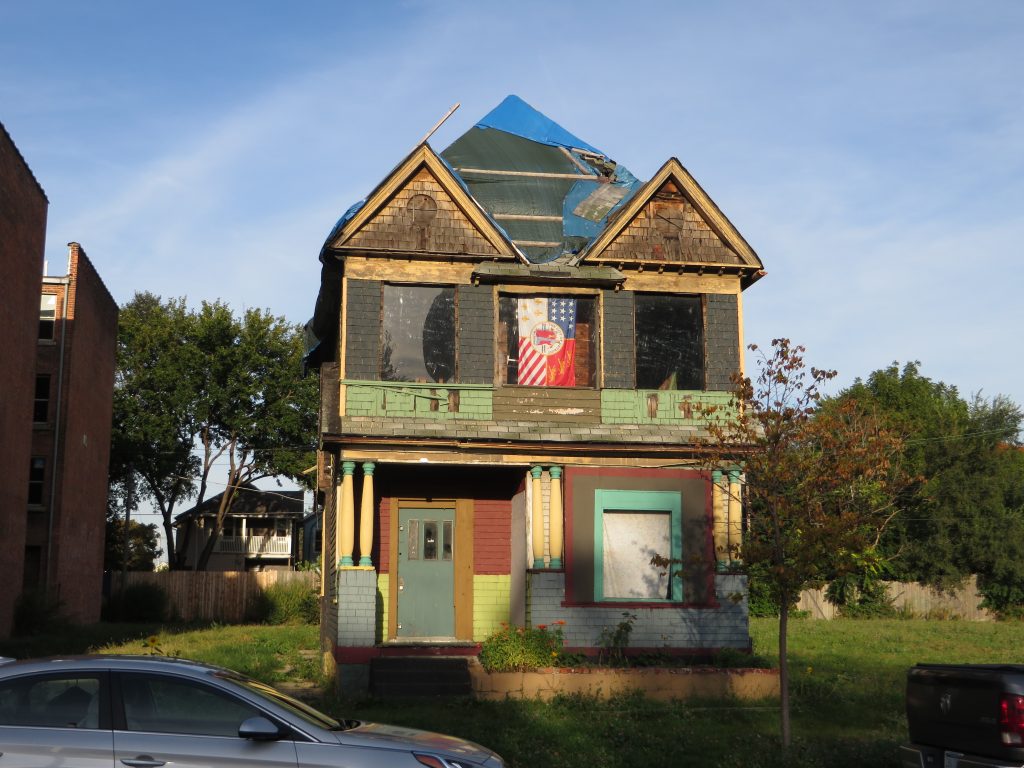Detroit Considers Switch to Land-Value Tax
All the city news you can use.

Vacant home in Detroit. Photo taken Sept. 25, 2015 by Ken Lund. (CC BY-SA 2.0 DEED)
Every day at The Overhead Wire we sort through over 1,500 news items about cities and share the best ones with our email list. At the end of the week, we take some of the most popular stories and share them with Urban Milwaukee readers. They are national (or international) links, sometimes entertaining and sometimes absurd, but hopefully useful.
Detroit for the land value tax: The land value tax promoted by Henry George in the late 19th century is seeing a resurgence in discussion. The City of Detroit is considering changing its structure to align more with a land value tax to disincentivize land speculation on vacant properties, thousands of which have been purchased by single entities. But the change depends on a vote by residents approval by the state to hold and election. (Rachel Cohen | Vox)
Land use reforms spur housing development: A recent analysis from the Pew Charitable Trusts found that land use reforms in Minneapolis have increased housing stock 12% while seeing a 1% increase in rents. The rest of the state has only increased housing stock 4% and seen a 14% increase in rents. And as rents have remained stable, wages have increased in Minneapolis creating even more value for renters. The changes also impact homelessness as well as rates fell in Minneapolis and went up around the state. (Molly Bolan | Route Fifty)
Drivers getting more dangerous: In a deep dive for the New York Times Magazine, Matthew Shaer looks at collective trauma, history, peer pressure, and current issues around traffic safety that have led to more fatalities on the roads in the United States. He also looks at the role of auto companies and how their focus on making money short changes safety for drivers and what increases in stress do to people behind the wheel. (Matthew Shaer | New York Times Magazine)
Pittsburgh’s innovative approach to stormwater: The latest National Climate Assessment is lauding Pittsburgh for innovate rules related to protecting residents against intense rainfall events that result from a changing climate. Large development projects with impervious surfaces are required to install green infrastructure for runoff and the rules are some of the first to be set based on expectations of future runoff. (Jon Hurdle | The Allegheny Front)
Quote of the Week
In his speech to the Conservative conference in October, Mark Harper, the transport secretary, described 15-minutes cities as schemes in which “local councils can decide how often you go to the shops”, which was incorrect and is something that has never been proposed in the UK. While many critics assumed at the time this was just rhetoric, the documents indicate Harper and the Department for Transport (DfT) used this definition as the basis for one of the biggest shifts in transport policy for decades.
–Peter Walker in The Guardian describing how the UK Transport Secretary used conspiracy theories to create policy.
This week on the podcast, we’re at the 2023 Mpact conference closing plenary in Phoenix Arizona. Assistant Secretary of Transportation for Transportation Policy at USDOT Christopher Coes leads a panel discussing what’s happening in central cities and how to make them thrive again.
Want more links to read? Visit The Overhead Wire and signup.
If you think stories like this are important, become a member of Urban Milwaukee and help support real, independent journalism. Plus you get some cool added benefits.
Urban Reads
-
Congestion Pricing Cuts Air Pollution in New York City
 Dec 14th, 2025 by Jeff Wood
Dec 14th, 2025 by Jeff Wood
-
We Think We Love to Drive. But Do We Really?
 Dec 7th, 2025 by Jeff Wood
Dec 7th, 2025 by Jeff Wood
-
Can Scott Wiener Tackle America’s Housing Crisis?
 Nov 23rd, 2025 by Jeff Wood
Nov 23rd, 2025 by Jeff Wood





















